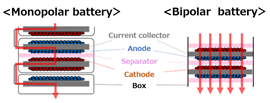Toyota outlines future vehicle battery development path
14 September 2023
 Monopolar versus Bipolar battery (Photo: Toyota Motor)
Monopolar versus Bipolar battery (Photo: Toyota Motor)
Toyota Motor has released its ‘advanced battery technology roadmap’ which outlines future battery types now under development and their anticipated launch dates.
The OEM, which also produces Hino Trucks in Japan, is planning three new liquid electrolyte battery technologies which can deliver higher power, longer range, faster recharging times and lower cost.
It has also revealed plans for the start of solid state li-ion battery mass production and incorporation into its vehicle line up.
In a related post, Takero Kato, president of the new BEV Factory, said: “We will need various options for batteries, just like we have different variations of engines. It is important to offer battery solutions compatible with a variety of models and customer needs.”
First up are the Performance range of li-ion batteries. These will be 20% less expensive than those which are used in the current Toyota bZ4X BEV, while supporting a rapid recharge time of 20 minutes (from 10 to 80%) and delivering a range of about 800 km (current range about 500 km). Introduction is expected in 2026, when Toyota will launch a series of all-new BEVs.
Next are the Popularisation battery packs, intended to promote the wider appeal of BEVs. The packs will use bipolar technology, first introduced by Toyota in its NiMh hybrid electric vehicle batteries, combined with lithium-ion phosphate (LiFePO) as the core material. They will return a 20% increase in range and a 40% reduction in cost when compared to the bZ4X BEV. Range will be about 600 km and recharging times are expected to be 30 minutes (10 to 80%). These are scheduled for launch in 2026-’27.
The third battery type is the High-Performance range, which combines the bipolar structure with li-ion chemistry and a high nickel cathode. Fitted in vehicles with improved aerodynamics and lighter weight, these packs should return a range in excess of 1000 km, together with a further 10% reduction in cost (compared to the Performance battery) and recharging times of 20 minutes or less (10 to 80%). These should reach the market by 2027-’28.
Toyota has also recently reported that it has made a ‘technological breakthrough’ in development of its li-ion solid state batteries.
As the name implies, these use a solid instead of a liquid electroyte, which allows for more rapid movement of ions through the material and an improved tolerance for high voltages and temperatures.
The trade-off with that has been that solid state batteries would return a shorter overall battery life. But the OEM reports that this issue has now been ‘overcome’ (with no specific details). As such, the company is targeting mass production in advance of commercial use by 2027-’28.
Further, while solid state batteries had been expected to be used primarily with hybrid electric vehicles, they are now expected to be used with next-gen BEVs.
The solid state batteries are forecast to deliver a range of about 1000 km, with a fast charging time of 10 minutes (10-80%).
A next-gen solid state battery is said to already be under development, which is targeting a 50% improve on the range delivered by the Performance battery, which would equate to about 1600 km on a single charge.
In addition to increased power density, the solid state batteries require less space than standard li-ion packs. This could be highly beneficial for applications such as heavy trucks, where up to six standard li-ion battery packs can weigh in excess of three tonnes.
STAY CONNECTED




Receive the information you need when you need it through our world-leading magazines, newsletters and daily briefings.
POWER SOURCING GUIDE
The trusted reference and buyer’s guide for 83 years
The original “desktop search engine,” guiding nearly 10,000 users in more than 90 countries it is the primary reference for specifications and details on all the components that go into engine systems.
Visit Now
CONNECT WITH THE TEAM










